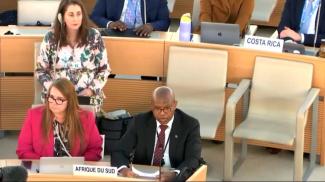
Geneva (Switzerland), March 21, 2024 (SPS) - The Republic of South Africa warned the United Nations Human Rights Council of the methods used by some parties within the HRC to prevent it from finding out the truth about the conditions in the occupied territories of Western Sahara and the grave violations committed there.
The Permanent Representative of South Africa to the United Nations and international organizations in Geneva, Ambassador Mxolisi Nkosi, said, “These methods cause concern,” noting that these parties relentlessly insist on perpetuating a fait accompli policy and the logic of denying the right to self-determination of the people of Western Sahara for political purposes.
He also added that the issue of Western Sahara has been among the files on the agenda of the United Nations Committee on Decolonization for decades, and the UN Security Council also adopted Resolution No. 690 (1991) to hold a referendum on self-determination for the Sahrawis, who today are deprived of this basic right to realize other rights.
The ambassador, Mxolisi Nkosi, added, “In 1975, the United Nations General Assembly adopted an advisory opinion on this issue, in addition to the decision of the African Court on Human Peoples’ Rights, which in turn affirmed that the occupying power (the Kingdom of Morocco) has no sovereignty over Western Sahara and States must refrain from recognizing this occupation or any actions that would deprive the Sahrawis of their right to self-determination.”
In light of the tragic situation in the Sahrawi occupied territories for decades, the Republic of South Africa called on the Human Rights Council to work to open the territory of Western Sahara to international bodies, put an end to any selectivity or double standards, and put an end to the suffering of the Sahrawis.
The South African delegate to the United Nations and international organizations in Geneva, Ambassador Mxolisi Nkosi, concluded his statement by asking the Office of the United Nations High Commissioner for Human Rights to indicate in its report the date on which it intends to send a mission to investigate human rights violations in Western Sahara.
SPS